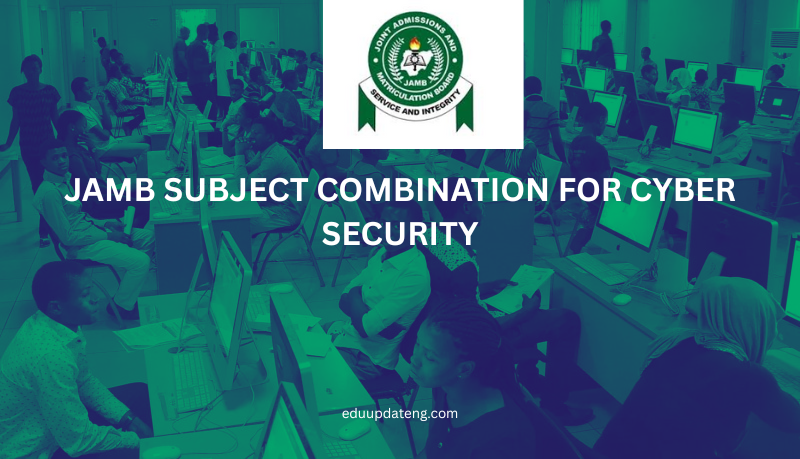JAMB Subject Combination for Cyber Security | Full Requirements & Schools

JAMB subject combination for Cyber Security, Cyber Security JAMB requirements, subjects for Cyber Security, WAEC requirements for Cyber Security, universities offering Cyber Security, cyber security admission requirements, UTME subject combination for Cyber Security.
Cyber security is one of the fastest-growing and most in-demand courses in the world today. As technology expands, cyber criminals also become smarter, leading to an increased demand for cyber security professionals who can protect individuals, companies, governments, financial systems, and critical digital infrastructure.
In Nigeria, Cyber Security has become one of the most competitive courses due to its global relevance, high salary prospects, and increasing career opportunities in tech, banking, defense, communication, and government agencies.
If you want to study Cyber Security in any Nigerian university, the first and most important step is to understand the correct JAMB subject combination, along with the O’level requirements, Direct Entry requirements, cut-off marks, and list of approved schools offering the course.
This admission guide provides everything you need to avoid mistakes that can cost you admission, especially wrong subject combinations which remain the number one reason many students are denied Cyber Security admission every year.
What is Cyber Security as a Course?
Cyber Security is the practice of protecting computer systems, networks, data, software, and digital infrastructure against cyber attacks such as:
- Hacking
- Malware
- Phishing
- Ransomware
- Identity theft
- Unauthorized access
- Data breaches
Students studying Cyber Security learn how to prevent, detect, respond to, and neutralize cyber threats. They are trained in:
- Ethical hacking
- Programming
- Cryptography
- Digital forensics
- Network security
- Cyber law and policy
- Penetration testing
- Cyber threat intelligence
- Cloud and database security
Cyber Security graduates are highly valued globally and earn some of the highest salaries in the tech industry.
JAMB Subject Combination for Cyber Security
The officially approved JAMB subject combination for Cyber Security is:
- Mathematics (Compulsory)
- Physics (Compulsory)
- Chemistry or Biology
- Use of English (Compulsory for all courses)
Explanation of the Subject Combination
- Mathematics: Cyber security involves algorithms, logical reasoning, computation, and encryption.
- Physics: Needed for understanding hardware components, networking, and system architecture.
- Chemistry/Biology: Universities give a flexible option here, but Chemistry is more commonly accepted.
- English: Mandatory for all JAMB candidates.
This subject combination applies to most universities offering Cyber Security.
O’level Requirements for Cyber Security (WAEC/NECO/NABTEB)
To study Cyber Security, candidates must have at least five (5) credit passes, including:
- Mathematics (Compulsory)
- English Language
- Physics
- Chemistry
- Biology, Computer Studies, or any other Science subject
Key Notes
- Credits must be obtained in not more than two sittings.
- Computer Studies/ICT is accepted by many universities, but not compulsory.
- Some institutions insist on Chemistry, while a few accept Biology as the fifth subject.
Direct Entry Requirements for Cyber Security
Candidates seeking admission through Direct Entry must have:
- Two (2) A-Level passes in Mathematics and either Physics, Chemistry, or Computer Science.
- OR ND/NCE in Computer Science, Cyber Security, Electrical/Electronics, or related disciplines (minimum of Upper Credit).
- OR HND for admission into 300 Level (if the university permits).
- O’level requirements must still be met.
Direct Entry candidates are usually admitted into 200 Level.
Cut-off Mark for Cyber Security
Cut-off marks vary depending on the institution:
Federal Universities:
180 – 220
State Universities:
160 – 180
Private Universities:
140 – 160
Highly competitive schools may set higher departmental cut-off marks.
Universities Offering Cyber Security in Nigeria (Updated List)
Here is the list of accredited Nigerian universities offering Cyber Security:
Federal Universities
- Federal University of Technology Akure (FUTA)
- Federal University of Technology Minna (FUTMINNA)
- University of Ilorin (UNILORIN)
- University of Lagos (UNILAG)
- Federal University of Technology Owerri (FUTO)
- University of Nigeria Nsukka (UNN)
- Ahmadu Bello University Zaria (ABU)
State Universities
- Lagos State University (LASU)
- Osun State University (UNIOSUN)
- Ekiti State University (EKSU)
- Delta State University (DELSU)
- Benue State University (BSU)
- Kaduna State University (KASU)
- Rivers State University (RSU)
Private Universities
- Babcock University
- Covenant University
- Nile University
- Lead City University
- Afe Babalola University (ABUAD)
- Caleb University
- Bowen University
- Newgate University Minna
Each school may have slight differences in admission requirements, so candidates are advised to check their specific portals.
Why Cyber Security is One of the Best Courses to Study in Nigeria
Cyber Security is one of the most rapidly growing fields in Nigeria and globally for several reasons:
- Increasing cyber crimes
- Growth of digital banking
- Expansion of cloud technologies
- High demand for cyber professionals in financial and tech industries
- Excellent global job opportunities
- High salary potential
- Opportunity to work remotely with international companies
With the rise of AI, digital transactions, and online businesses in Africa, skilled cyber security professionals are needed more than ever.
Skills You Will Learn While Studying Cyber Security
Studying Cyber Security equips students with powerful and globally relevant skills, including:
- Ethical hacking & penetration testing
- Network configuration and security
- Cryptography & encryption
- Malware analysis
- Programming (Python, C++, Java, PHP)
- Cloud computing
- Firewall and intrusion detection
- Database security
- Cyber security policy & risk management
- Digital forensics and investigation
These skills prepare students for high-paying careers across multiple industries.
Career Opportunities for Cyber Security Graduates
Cyber Security graduates can work in various job positions, such as:
- Cyber Security Analyst
- Ethical Hacker / Penetration Tester
- Security Operations Center (SOC) Analyst
- Network Security Engineer
- IT Auditor
- Cloud Security Specialist
- Risk Management Officer
- Cyber Threat Intelligence Analyst
- Digital Forensic Investigator
- Database Security Engineer
- Computer Incident Response Specialist
Globally, cyber security experts earn very high salaries, especially in tech companies, banks, security agencies, and fintech organizations.
Common Mistakes Students Make When Choosing JAMB Subject Combination for Cyber Security
Many candidates lose admission opportunities due to avoidable mistakes such as:
1. Choosing wrong subjects
For example, choosing Economics instead of Physics may disqualify you.
2. Not including Mathematics
Mathematics is the number one core subject for Cyber Security.
3. Ignoring university-specific requirements
Every school has slight variations; checking the brochure saves you from mistakes.
4. Using wrong O’level subjects
Missing Physics, Chemistry, or Mathematics can invalidate your application.
5. Low JAMB score
Cyber Security is highly competitive; a low score may reduce your chances.
Frequently Asked Questions (FAQs)
1. What is the compulsory subject for Cyber Security in JAMB?
Mathematics and Physics are compulsory.
2. Can I study Cyber Security without Physics?
No. Physics is essential and cannot be replaced.
3. Is Cyber Security a science or commercial course?
Cyber Security is strictly a science and technology course.
4. Can an art student study Cyber Security?
No, unless you have the required science subjects.
5. What is the best university to study Cyber Security in Nigeria?
Top choices include FUTA, FUTMINNA, FUTO, UNILAG, UNILORIN, and ABU.
6. Is Cyber Security a good course in Nigeria?
Yes, it is one of the highest-demand and highest-paying tech courses today.
Read Also: JAMB Subject Combination for Statistics | Full Requirements & UTME Guide
Understanding the correct JAMB subject combination for Cyber Security is the first major step towards gaining admission in the academic year. Cyber Security is a highly competitive and rewarding course, so applicants must ensure they meet the O’level requirements, choose the right JAMB subjects, and apply early to improve their chances.
The demand for cyber security professionals continues to rise, making it one of the most future-proof courses for Nigerian students. With the right preparation and correct subjects, you can successfully secure admission into any top university offering Cyber Security.





